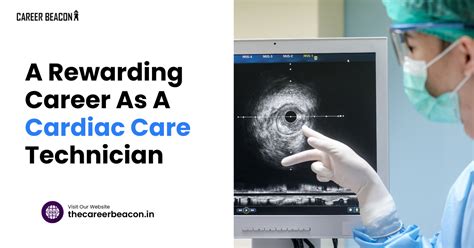Cardiac monitoring is a crucial aspect of healthcare, enabling medical professionals to diagnose and treat heart-related conditions effectively. The role of a Cardiac Monitor Technician (CMT) is vital in this process, as they are responsible for observing and analyzing the heart rhythms of patients. If you're interested in pursuing a career in the medical field and want to make a difference in people's lives, consider exploring Cardiac Monitor Tech jobs.
The Importance of Cardiac Monitoring
Cardiac monitoring is essential for patients with heart conditions, as it allows healthcare providers to identify potential complications early on. This enables them to take prompt action, preventing severe consequences and improving patient outcomes. Cardiac monitoring is also crucial in emergency situations, such as heart attacks or strokes, where timely intervention can be the difference between life and death.
The Role of a Cardiac Monitor Technician
A Cardiac Monitor Technician plays a vital role in the healthcare team, working closely with cardiologists, nurses, and other medical professionals to ensure optimal patient care. Their primary responsibilities include:
- Monitoring and analyzing heart rhythms using electrocardiogram (ECG) equipment
- Identifying abnormal heart rhythms and reporting them to medical staff
- Maintaining accurate records of patient data and test results
- Assisting with stress tests, Holter monitor tests, and other cardiac procedures
- Educating patients and their families about cardiac monitoring and testing procedures
Benefits of a Career as a Cardiac Monitor Technician
Pursuing a career as a Cardiac Monitor Technician offers numerous benefits, including:
- Job Satisfaction: Working in a field where you can make a real difference in people's lives can be incredibly rewarding.
- Job Security: The demand for CMTs is high, and this demand is expected to continue growing in the coming years.
- Competitive Salary: Cardiac Monitor Technicians are generally well-compensated, with median salaries ranging from $50,000 to over $70,000 per year.
- Opportunities for Advancement: With experience and additional education, CMTs can move into leadership roles or pursue specialized certifications.
Requirements for Becoming a Cardiac Monitor Technician
To become a Cardiac Monitor Technician, you'll need to meet certain educational and training requirements. These typically include:
- Education: A high school diploma or equivalent is usually the minimum educational requirement. Many CMTs also hold an associate's degree or certificate in a related field, such as cardiovascular technology.
- Training: Formal training in cardiac monitoring and electrocardiography is essential. This can be obtained through a training program or on-the-job experience.
- Certification: While not always required, certification can be beneficial in securing a job or advancing in your career. The Certified Cardiographic Technician (CCT) or the Certified Electrocardiogram Technician (CET) certifications are two common options.

Skills and Qualities Required for Success
To be successful as a Cardiac Monitor Technician, you'll need to possess certain skills and qualities, including:
- Attention to Detail: Accurate monitoring and analysis of heart rhythms require attention to detail and a focus on precision.
- Strong Communication Skills: Effective communication with patients, families, and healthcare staff is essential in this role.
- Analytical Skills: CMTs must be able to analyze complex data and make informed decisions quickly.
- Compassion and Empathy: Working with patients who may be experiencing anxiety or stress requires compassion, empathy, and a caring demeanor.
Types of Cardiac Monitor Tech Jobs
There are various types of Cardiac Monitor Tech jobs available, including:
- Hospital-Based CMTs: Working in a hospital setting, these CMTs monitor and analyze heart rhythms in real-time, providing critical support to medical staff.
- Outpatient CMTs: In outpatient settings, CMTs may work in clinics, physician offices, or cardiac rehabilitation centers, performing non-invasive tests and monitoring patients.
- Research CMTs: These CMTs work in research settings, assisting with clinical trials and studies focused on cardiac health.
Conclusion: A Rewarding Career Path
Cardiac Monitor Tech jobs offer a rewarding and challenging career path for those interested in the medical field. With the right education, training, and skills, you can make a real difference in people's lives while enjoying a stable and well-compensated career.
Gallery of Cardiac Monitoring





Frequently Asked Questions
What is the role of a Cardiac Monitor Technician?
+A Cardiac Monitor Technician is responsible for monitoring and analyzing heart rhythms using electrocardiogram (ECG) equipment, identifying abnormal heart rhythms, and reporting them to medical staff.
What are the educational requirements for becoming a Cardiac Monitor Technician?
+A high school diploma or equivalent is usually the minimum educational requirement. Many CMTs also hold an associate's degree or certificate in a related field, such as cardiovascular technology.
What is the average salary for a Cardiac Monitor Technician?
+The median salary for a Cardiac Monitor Technician ranges from $50,000 to over $70,000 per year, depending on experience and location.
